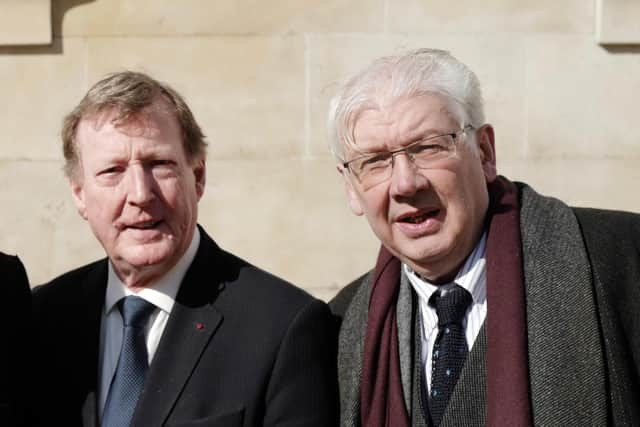Lord Bew says it is disgraceful that David Trimble was never consulted about Northern Ireland Protocol
and live on Freeview channel 276
But the peer and historian insisted the former first minister was right to accuse the EU and the Irish and British governments of endangering the Belfast Agreement he helped create by the NI Protocol.
“While I think David didn’t get how destabilising Brexit was going to be, he had every right since to ask the main players ‘What have you done to my Good Friday Agreement?’ It is disgraceful to note that even during the post-Brexit negotiations the May government never consulted him once about what implications a deal with Europe had for Northern Ireland or the Belfast/Good Friday Agreement. Nor was he ever consulted about the protocol even though he was a Conservative peer,” Lord Bew said.
Advertisement
Hide AdAdvertisement
Hide AdReflecting on a friendship that stretched back to the late 1970s, he recalled first coming across Lord Trimble on an interview panel for a lectureship he was applying for at Queen’s University Belfast.


“I remember it was 1979 and David was on a very large interview panel but it became obvious he was the only one on it who had actually read my books. I had published two books before I applied for the post at Queen’s (‘Land and the National Question 1858-62’ and ‘The State in Northern Ireland with Henry Patterson’) and David was able to talk at length about them, and query me in particular about the references to Churchill. He had done his homework,” he said.
The cross-bencher independent peer pointed out that in the early 1980s Lord Trimble – then the assistant dean of law at QUB – was a prolific pamphleteer writing about subjects, which in Lord Bew’s view, indicated a willingness to compromise with Irish nationalism.
“I remember one paper he wrote for the ‘Ulster Society’ in defence of Sir James Craig who was coming under fire from hard-line unionists for forming pacts and holding meetings with Michael Collins and Eamon de Valera.
Advertisement
Hide AdAdvertisement
Hide Ad“David’s key theme was that Craig had been right to take the risk in negotiating with Collins and Dev. In fact, I remember he quoted a phrase of Craig’s which the Northern Ireland prime minister used to silence his ultra critics, asking them if they ‘wanted to fight these people forever’. By ‘these people’ Craig meant nationalism.
“It was obvious reading that work that David admired Craig’s pragmatism. It was the kind of pragmatism he later adopted in his own political career,” Lord Bew said.
He pointed out that Lord Trimble was one of the first voices within unionism after the 1974 Ulster Workers Strike to argue for a voluntary power-sharing coalition with the SDLP.
Lord Trimble would eventually share power with nationalists more than 20 years later after the signing of the Belfast Agreement.
Advertisement
Hide AdAdvertisement
Hide AdHis former advisor said he believes securing the consent principle at the heart of the agreement was “David’s big win” on Good Friday 1998.
He said: “The big win, David’s big win, was on the constitutional question in Northern Ireland. Irish nationalism accepted that there could be no constitutional change to Northern Ireland unless the majority consented to it.
“Where he lost out were on the emotional issues of early paramilitary prisoner releases and the IRA guns. Decommissioning came too late for David and the issue dogged the rest of his leadership.”
Lord Bew said the nadir of Lord Trimble’s career was losing his Upper Bann Westminster seat to the DUP in 2005.
Advertisement
Hide AdAdvertisement
Hide Ad“I know that he loved the House of Commons, he loved going over there and felt at home in it. But he risked his seat in Upper Bann for what he thought was the greater good and people should always remember that.”
He recalled that Lord Trimble had managed to obtain a slim but significant majority within the unionist community at the time of the May 1998 referendum to endorse the Belfast Agreement. He said there were lessons in this for those advocating for a hard protocol today.
“We were told in 1998 that the agreement would only pass if there were majorities in both communities in favour of it. Perhaps that same thinking then should apply today when it comes to the protocol.”
Just two months before his death the former Ulster Unionist leader was still engaged in Northern Ireland politics, writing a foreword to a paper by think tank Policy Exchange, which questioned the concept of an all-Ireland economy.
Advertisement
Hide AdAdvertisement
Hide Ad“I know that David was in Stockholm in May on what was to be his last holiday with Daphne and there he was editing and correcting the proofs of the foreword. It was typical of him.”
Lord Bew stressed that David Trimble was a “man of many parts who loved wine, opera and Elvis Presley as well as politics.”